

'The Cloud' and Other Dangerous Metaphors. Contemporary ideas about data and privacy are tied up inextricably with language choices.
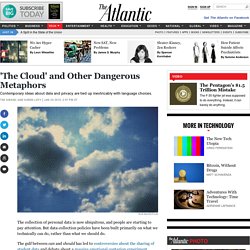
The collection of personal data is now ubiquitous, and people are starting to pay attention. But data-collection policies have been built primarily on what we technically can do, rather than what we should do. The gulf between can and should has led to controversies about the sharing of student data and debate about a massive emotional contagion experiment conducted on the News Feeds of close to 700,000 users on Facebook. Researchers of all stripes are scrambling to find a clear way forward in uncharted ethical territory. Underlying the discussion has been a tangle of big, thorny questions: What policies should govern the use of online data collection, use, and manipulation by companies? While much has been written about these questions, there's also the the deeper issue of how people have been attempting to answer them.
This is still just a partial solution. ISO Adopts Standard for Privacy in the Cloud. The use of public cloud computing services- broadly defined as contracting with another company for the provision of computing resources (networks, storage, applications, and services), offers many potential benefits for businesses, among them economies of scale, lower capital costs, and improved accessibility.

At the same time, the nature of cloud computing services presents a number of legal and compliance challenges for businesses and cloud services providers alike. For example, numerous data protection laws require businesses to safeguard personal information. These data protection laws – such as statutes based on the European Union Directive 95-46 (the “EU Data Protection Directive) -- often limit or restrict the international transfer of sensitive information, and require organizations controlling or processing data to execute Model Contract Clauses or Binding Corporate Rules in order to effect cross-border data transfers. Cloud computing and privacy series: security requirements and guidance (part 3 of 6)
The issues related to confidentiality and security play an important role in data protection.

This is even more so when considering an information technology environment, and thus when considering cloud computing. Security is therefore at the forefront of current issues that private but also public stakeholders must face today. In this third article of our cloud computing and privacy series (see our previous articles here and here), we examine some of the security requirements and guidance that apply to cloud computing in the EU and in certain key Member States(1). Legal security requirements It results from our study that security is currently one of the most regulated topics in the field of data protection, as well as in the field of telecommunications.
The importance given to security is constantly increasing and is expected to keep playing a central role in the future.
ENISA From transparency to trust in the Cloud. Google announces a new Cloud platform. Should lawyers entrust client confidentiality to cloud computing. Europe Aims to Regulate the Cloud. Cloud computing in education. Cloud Computing Tops Most Disruptive Technologies List. So what will be keeping your organization’s CISO from getting a good night’s sleep in 2013?

While the answer to that question might vary from business to business, the unifying factors underlying the cause for your enterprise security chief’s insomnia will most likely be tied to the rapid adoption of new technologies that are outpacing the resources available for many information security programs. The culprits? According to a new study by the Security for Business Innovation Council (SBIC), the main areas of concern from a security standpoint will include mobile device management, corporate social media engagement, and big data for market intelligence – but topping the list will be the migration of business critical processes to the cloud.
“These trends will have a big impact on information- security programs, revealing significant and growing gaps including a lack of business skills, relationships, supply chain management, and tech-savvy action plans,” the SBIC report states.
'as-a-service' IR/PS - Media Center - News - Peter Cowhey Completes Report on Cloud Computing. 10/18/2012 Mel Fabrikant , ParamusPost.com New report details how 60 percent of world server workloads to take place on cloud computers by 2014.

As the world prepares to convene for the World Conference on International Telecommunications (WCIT 2012), the role of cloud computing in creating economic opportunity and enabling the rapid flow of information in the developing world continues to gain momentum. This according to a new report, “Unlocking the Benefits of Cloud Computing for Emerging Economies—A Policy Overview” by Peter F.
Cowhey and Michael Kleeman of the University of California San Diego, which examines the critical benefits to lower and middle-income economies, in particular those of India, Mexico and South Africa, from international and domestic adoption of cloud computing. Click here to read the full article. Related Links Peter Cowhey is Dean at the School of International Relations and Pacific Studies.
How Cloud Computing Is Changing Toyota. ToyotaZack Hicks, Toyota's CIO, North America Spend a few minutes talking to Zack Hicks, Toyota's top technology executive in North America, and you'll walk away with a startling revelation: Cloud computing is changing everything about our world from how we work to how we manage our health.
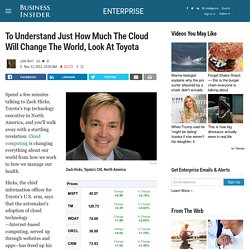
Hicks, the chief information officer for Toyota's U.S. arm, says that the automaker's adoption of cloud technology—Internet-based computing, served up through websites and apps—has freed up his staff to work on more meaningful projects. And those are really life-changing things, like apps that can monitor your vital signs. Last month, Hicks freed up more of his team from desktop-support drudgery when Toyota signed a massive deal with Microsoft Office 365, its cloud alternative to Exchange email and Microsoft Office desktop software. The deal took more than two years, but in the end Toyota is ditching IBM's Lotus Notes and putting its entire worldwide workforce of 200,000 employees on Office 365. Why? DLA Piper, Global Law Firm. IAPP. Broadcast Date: October 4th, 2012 11:00 am – 12:30 p.m.
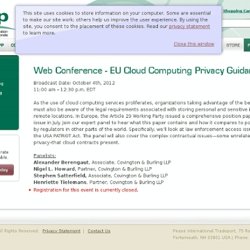
EDT As the use of cloud computing services proliferates, organizations taking advantage of the benefits offered must also be aware of the legal requirements associated with storing personal and sensitive information in remote locations. In Europe, the Article 29 Working Party issued a comprehensive position paper on the issue in July. Join our expert panel to hear what this paper contains and how it compares to positions taken by regulators in other parts of the world. Panelists: Alexander Berengaut , Associate, Covington & Burling LLP Nigel L. Stephen Satterfield, Associate, Covington & Burling LLP Henriette Tielemans , Partner, Covington & Burling LLP Registration for this event is currently closed.
Cloud computing leaves the hype behind. Cloud computing leaves the hype behind Cloud computing is growing up and is maturing into a stable market for government contractors.
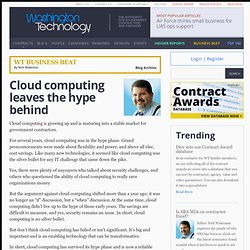
For several years, cloud computing was in the hype phase. Grand pronouncements were made about flexibility and power, and above all else, cost savings. Like many new technologies, it seemed like cloud computing was the silver bullet for any IT challenge that came down the pike. Cloud computing: some practical suggestions for resolving issues – part 2. In Part I of this series we outlined some of the practical approaches to consider at the outset of a cloud arrangement.
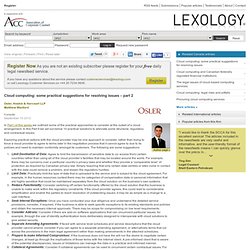
In this Part II we set out below 10 practical solutions to alleviate some structural, regulatory and contractual issues: Exploring practical options with the cloud provider may be one approach to consider, rather than trying to force a cloud provider to agree to terms later in the negotiation process that it cannot agree to due to its policies and need to maintain conformity amongst its customers. The following are some suggestions: Limit Destination of Data: Agree to limit the transmission of sensitive data to (or access from) certain countries rather than using all of the cloud provider’s facilities that may be located around the world. For example, there may be concerns over a particular country’s privacy laws and whether they provide a ‘comparable level’ of protection as required by Canadian privacy law. INDEPENDENT online. Creative Industries / Pressure mounts on EU cloud deal as deadline looms. BRUSSELS - The European Commission is under pressure to keep to its self-imposed September deadline to publish an EU cloud computing strategy, as new evidence revealed widespread public confusion about it.

The commission has two weeks to meets its EU cloud deadline (Photo: The Planet) Figures collected by opinion pollsters Ipsos for the Business Software Alliance (BSA), an IT lobby group, indicate that most Europeans regularly use cloud technologies but are unaware that they are doing so. A mere 24 percent said that they used cloud computing, with Greece and Romania topping the poll at 39 percent. Meanwhile 65 percent of PC users admitted that they had either never heard of cloud computing or had only heard of the name. However, four in five European's regularly use email services, the most commonly-used cloud service, with more than one in three regularly playing online games and using photo storage devices like Dropbox.
Corporate strategy. Cloud and security. Mobile cloud strategy. Study Finds EU Copyright Law Harms Investment In Cloud Computing. IP-Watch Interns Summer 2013 IP-Watch interns Brittany Ngo (Yale Graduate School of Public Health) and Caitlin McGivern (University of Law, London) talk about their Geneva experience in summer 2013. 2:42. Submit ideas to info [at] ip-watch [dot] ch! We welcome your participation in article and blog comment threads, and other discussion forums, where we encourage you to analyse and react to the content available on the Intellectual Property Watch website.
By participating in discussions or reader forums, or by submitting opinion pieces or comments to articles, blogs, reviews or multimedia features, you are consenting to these rules. 1. 2. 3. 4. 5. 6. 7. 8. 9. An Interactive eGuide: The Private Cloud: Computerworld White Paper. Cloud computing needs kick-start in Europe: Study.
ENISA. UK cloud computing. Htg-cloud. International DPA Working Group Publishes Working Paper on Privacy Issues in Cloud Computing. Following a meeting in Sopot, Poland, on April 24, 2012, the International Working Group on Data Protection in Telecommunications (the “Working Group”), led by the Berlin Commissioner for Data Protection and Freedom of Information, issued a Working Paper that focuses on privacy and data protection issues related to the use of cloud computing in the international context.
FFIEC statement in US. Cloud computing: 10 ways it will change by 2020. Right now we are in the early days of cloud computing, with many organisations taking their first, tentative steps. But by 2020 cloud is going to be a major — and permanent — part of the enterprise computing infrastructure. Eight years from now we are likely to see low-power processors crunching many workloads in the cloud, housed in highly automated datacentres and supporting massively federated, scalable software architecture. Cloud Servers.
Cloud & organizing. Cloud Storage. Cloud Storage. @ Cloud Computing. Cloud Computing for dummies.
WP art29. German DPA recommendations. CLOUD COMPUTING, CLICKWRAP AGREEMENTS, AND LIMITATION ON LIABILITY CLAUSES: A PERFECT STORM? Abstract [*163] “To the cloud!” Trumpets a commercial by Microsoft, whose aim is to herd customers, and their checkbooks, into the cloud computing fold. But Microsoft, and other cloud providers like Amazon and Google, might inadvertently be doing just the opposite.
It is not for lack of security or even early adopter apprehension that potential customers might turn away. Nor is it a lack of fantastic, cost-saving applications of cloud technology. Rather, the problem is buried deep within these tech giants’ clickwrap agreements—the ones that customers rarely read and to which they invariably click “I Agree.” Impact du Cloud sur la transformation des Infrastructures et des organisations - techtoc.tv, web-tv.
You are a lecturer, journalist, blogger, speaker and you need the source video file?
Neelie Kroes Vice-President of the European Commission responsible for the Digital Agenda EU Data protection reform and Cloud Computing “Fuelling the European Economy” event, Microsoft Executive Briefing Centre Brussels, 30 January 2012. Neelie Kroes. Active in Cloud, Amazon Reshapes Computing. Every day, a start-up called the Climate Corporation performs over 10,000 simulations of the next two years’ weather for more than one million locations in the United States. Thoughts on Privacy and Data Security from the May 11 PLI Cloud Computing Seminar. Full Length Video of Cloud Computing and Privacy Session Available Through This Entry. Cloud Computing Confusion: Survey Says US is Clueless about Cloud. Cloud Computing Issue Paper.